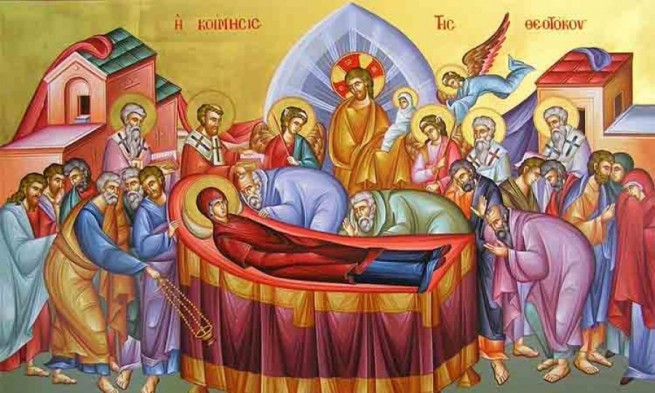The Feast of the Dormition of the Most Holy Theotokos was established in memory of the day when the earthly life of the Mother of God ended. In Greece, it is one of the main Christian holidays, which is otherwise called “summer Easter”.
The holiday is one of the twelve, that is, the twelve largest Christian holidays. It is preceded by a fairly strict Assumption fast.
The word “assumption” means a peaceful death. On this day, Christians celebrate the ascension of the Mother of God into heaven and reunion with God.
According to legend, three days before the death of the Mother of God, the archangel Gabriel appeared and warned her about the transition to heavenly life, which should take place very soon, and, as a sign of confirmation of his presence and the veracity of what was said, gave her a palm branch.
On the indicated day, the apostles, who preached in different countries, miraculously gathered in Jerusalem to say goodbye and perform the burial of the Mother of God. And Jesus Christ himself, accompanied by the souls of the righteous, angels and archangels, descended to earth and took the body and soul of the Mother of God to heaven.
The Christian faith views death as a test that everyone must pass in order to move on to eternal life. Therefore, the church calls this day the Assumption, and not death. Thus, the Assumption of the Virgin is considered a holiday, and not a reason for sadness, because the Mother of God was reunited with her son.
History and meaning of the holiday
After the Ascension of the Lord, the Mother of God remained in the care of the Apostle John the Theologian, to whom Jesus Christ bequeathed to take care of her as of her own mother.
For the closest disciples of Jesus Christ and all believers, she was a consolation and edification. The apostles wrote down everything that the Mother of God told about her life and the life of her son.
Once, when the Blessed Mary was praying on the Mount of Olives, the archangel Gabriel appeared to her with a heavenly date branch in his hands and brought the news that in three days her earthly life would end and the Lord would take her to him. The Mother of God rejoiced at this news: she realized that she could meet her son.
After the death of the Mother of God, the apostles buried her body in Gethsemane. Everyone was present at the ceremony, except for the Apostle Thomas. On the third day, when Thomas arrived at the Mount of Olives, he wished to see her coffin. It was opened, but the body of the Mother of God was no longer in it, only the shroud lay there.
On the same evening, the Mother of God appeared to the apostles surrounded by angels and said: “Rejoice! I am always with you all the days and will always be your prayer book before God.”
Traditions and fasting
According to church tradition, the feast of the Assumption of the Most Holy Theotokos is preceded by fasting, the foundations of which were established in the 7th century. Initially, it was divided into two periods: before the feast of the Transfiguration of the Lord and before the feast of the Assumption of the Virgin. Both of them in the X century were combined into a single one, which includes 14 days and begins on August 1.
As during any Orthodox fast, not only bodily abstinence is important during the Assumption Fast, but also spiritual, that is, you should try not to indulge in noisy entertainment.
According to the church charter, these days the severity of the meal is the same as in Great Lent, that is, meat and dairy products, eggs are excluded, and fish is allowed only on the feast of the Transfiguration of the Lord.
According to some monastic charters, it is prescribed:
- on Mondays, Wednesdays and Fridays – dry eating;
- on Tuesdays and Thursdays – boiled food without vegetable oil;
- on Saturdays and Sundays vegetable oil and wine are allowed.
On the feast of the Assumption of the Most Holy Theotokos on August 15, if it falls on Wednesday or Friday, fish is allowed, and the breaking of the fast is postponed to the next day. If it falls on other days of the week, then there is no fasting.
On the days of fasting on August 15, in the afternoon hours in churches (except Sundays), divine services are held: οτόκον” and “Παρακλήσεις”.







More Stories
Making a mockery of the Acropolis for the sake of tourism
How Plato spent his last night – what the found papyri showed
Eurovision 2024: the first rehearsal of Marina Satti in Malmö has ended